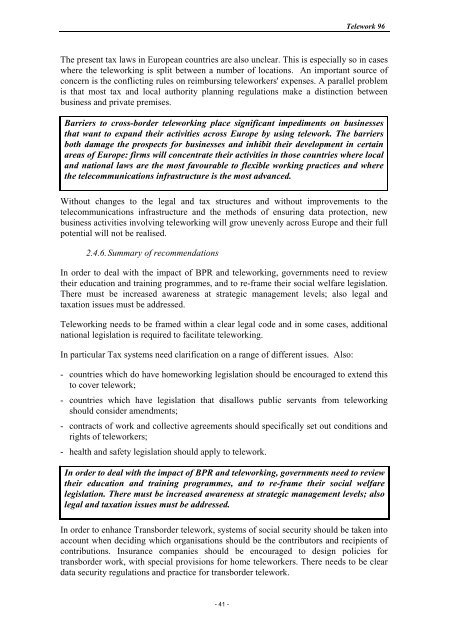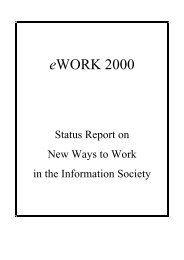1996 - European Telework Week
1996 - European Telework Week
1996 - European Telework Week
- No tags were found...
Create successful ePaper yourself
Turn your PDF publications into a flip-book with our unique Google optimized e-Paper software.
<strong>Telework</strong> 96<br />
The present tax laws in <strong>European</strong> countries are also unclear. This is especially so in cases<br />
where the teleworking is split between a number of locations. An important source of<br />
concern is the conflicting rules on reimbursing teleworkers' expenses. A parallel problem<br />
is that most tax and local authority planning regulations make a distinction between<br />
business and private premises.<br />
Barriers to cross-border teleworking place significant impediments on businesses<br />
that want to expand their activities across Europe by using telework. The barriers<br />
both damage the prospects for businesses and inhibit their development in certain<br />
areas of Europe: firms will concentrate their activities in those countries where local<br />
and national laws are the most favourable to flexible working practices and where<br />
the telecommunications infrastructure is the most advanced.<br />
Without changes to the legal and tax structures and without improvements to the<br />
telecommunications infrastructure and the methods of ensuring data protection, new<br />
business activities involving teleworking will grow unevenly across Europe and their full<br />
potential will not be realised.<br />
2.4.6. Summary of recommendations<br />
In order to deal with the impact of BPR and teleworking, governments need to review<br />
their education and training programmes, and to re-frame their social welfare legislation.<br />
There must be increased awareness at strategic management levels; also legal and<br />
taxation issues must be addressed.<br />
<strong>Telework</strong>ing needs to be framed within a clear legal code and in some cases, additional<br />
national legislation is required to facilitate teleworking.<br />
In particular Tax systems need clarification on a range of different issues. Also:<br />
- countries which do have homeworking legislation should be encouraged to extend this<br />
to cover telework;<br />
- countries which have legislation that disallows public servants from teleworking<br />
should consider amendments;<br />
- contracts of work and collective agreements should specifically set out conditions and<br />
rights of teleworkers;<br />
- health and safety legislation should apply to telework.<br />
In order to deal with the impact of BPR and teleworking, governments need to review<br />
their education and training programmes, and to re-frame their social welfare<br />
legislation. There must be increased awareness at strategic management levels; also<br />
legal and taxation issues must be addressed.<br />
In order to enhance Transborder telework, systems of social security should be taken into<br />
account when deciding which organisations should be the contributors and recipients of<br />
contributions. Insurance companies should be encouraged to design policies for<br />
transborder work, with special provisions for home teleworkers. There needs to be clear<br />
data security regulations and practice for transborder telework.<br />
- 41 -








